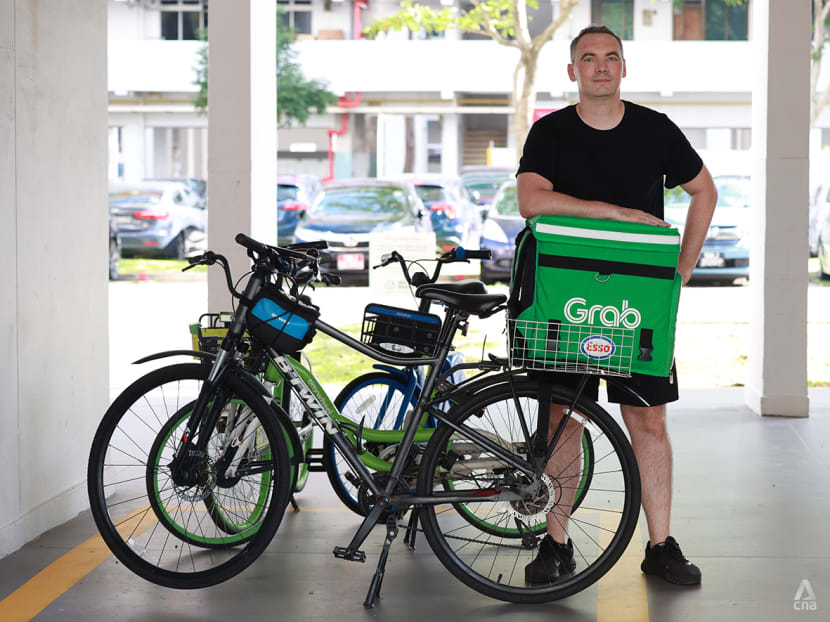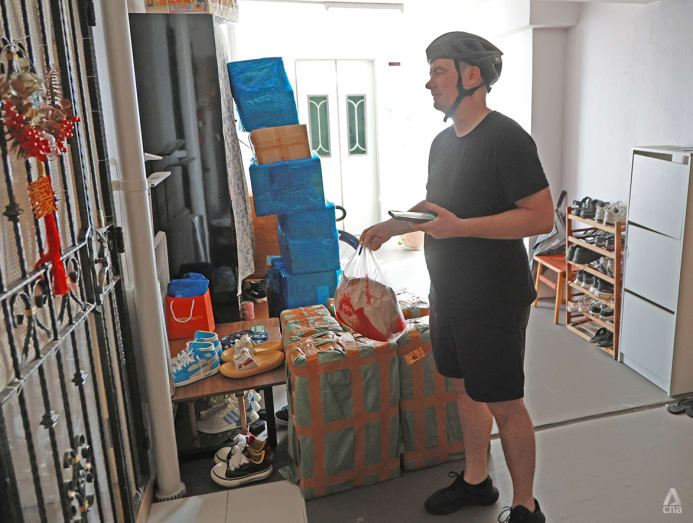The expat who raised S$7,000 in 11 months doing food deliveries in his free time and donated it all to charity
French national and Singapore permanent resident Yann AitBachir said the work helps him connect with a part of Singapore that he might not otherwise experience in his usual lifestyle.

Mr Yann AitBachir, who holds a full-time job in the tech industry, spends his weekends doing food deliveries and donates the profits to charity. (Photo: CNA/Raj Nadarajan)

This audio is generated by an AI tool.
While working on a story last year about the challenges that food delivery riders face, I spent some time at the rest areas of popular malls around Singapore, hoping to catch up with riders on their break.
When I first met Mr Yann AitBachir outside Paya Lebar Quarter mall, he was dressed in a nondescript outfit comprising a plain black t-shirt paired with black shorts and a helmet, along with a bright green Grab delivery bag perched at the back of his bicycle.
What caught my attention was Mr AitBachir himself – the 43-year-old French national was seated on an outdoor bench, among a sea of other local riders on their respective breaks.
I struck up a brief conversation with him and found out that he was there like all the other riders to pick up food orders for delivery. Unlike the others, however, he was donating what he earned that day to charity.
Our chat was soon interrupted by a ‘ping’ from his Grab application, signalling that a new order had come in.
Still, that encounter stayed with me and I was intrigued that he was going around delivering chicken rice and other food to raise funds for charity in his free time.
TECH WORKER BY DAY, DELIVERY RIDER BY NIGHT
We reconnected in late November and I asked if I could shadow him while he made his rounds.
I hopped on my bicycle and tried to keep up with him, chatting as we zigzagged through the streets of Katong.
Under a mid-afternoon shower, I found out that the Singaporean permanent resident holds a full-time job as an artificial intelligence specialist at Google.
His “moonlighting”, which he started in February last year, began with a desire to be more active outside of work, given his sedentary day job.
Deciding that he also wanted to combine this activity with “doing good” led him to donate all that he earned from the deliveries to various charities.
Between February and December last year, Mr AitBachir was able to raise about S$7,000 out of the S$10,000 goal he had initially set for himself.
He topped up the shortfall from his own savings, and then some more, but declined to reveal how much he eventually donated to charities last year.
This year, he hopes to raise S$10,000 entirely from doing deliveries.
While he declined to disclose his salary, the Joo Chiat resident told me that he is a “high-earning tech worker”, and that this – coupled with his background as an expatriate – made him concerned that he would become rather “disconnected” from local communities here.
“Even though I’ve been fortunate, delivering with Grab keeps me grounded,” said Mr AitBachir, who has been in Singapore since 2009.
Through his part-time work, he values being able to foster interactions with communities around him, which include locals and the elderly living in the heartlands, as well as other food delivery riders.
“When I do deliveries, I become a frontline worker (of sorts) and I really connect with a part of Singapore that I might otherwise not be connected to by my natural lifestyle.”
His delivery work has served as a “good icebreaker” for all his social interactions, said Mr AitBachir, adding that he also receives encouragement at times from the customers he delivers to.
And while some of his friends initially poked fun at his side endeavour, they became supportive after finding out his motivations for doing so.
“When my friends and colleagues discovered that I was doing deliveries on the weekend, they started by making jokes, asking if I was not making enough money with my regular job. But when I explain why I am doing so, I received a lot of encouragement,” he said.
Noting how physically challenging and gruelling the role of a rider can be, Mr AitBachir said doing gig work has also helped him to “reconnect with the value of money”.
“You do realise the amount of work that you need to (put in to) earn S$20, S$25. When you have a very high salary, you might not realise that you spend very quickly if you go out – a few hundred dollars in the restaurant, on drinks, or on a taxi (on a weekend).”
Weaving between traffic on the road as we cycled together in the rain – which, shortly after, gave way to a warm late afternoon sun – I began to catch a glimpse of what he meant.
As we rushed between locations to ensure the food was delivered on time and intact, I urged him to go ahead at some point so that I would not be a burden and affect his platform rating.
On average, Mr AitBachir devotes about ten hours in total across the weekend to doing these deliveries and even does it on weekday nights if work and family life permits.
He typically raises between S$700 and S$1,000 a month, which he alternates between donating to charities focused on environmental conservation and fighting poverty.
When doing deliveries, he also leaves a note in his Grab app stating that he is working for a charitable cause.
If customers give him a tip, he also matches the tip and donates all of it.

CONNECTING WITH CUSTOMERS, COMPLAINING WITH OTHER RIDERS
Asked about some of his most memorable interactions on the job, Mr AitBacher recounts a time when he was delivering a birthday cake to a public housing flat unit in Bedok.
The order for the cake had been placed by the 81-year-old homeowner’s daughter, who was travelling overseas at the time.
As part of the order, she asked if the delivery rider could wish her father a “happy 81st birthday” when delivering the cake.
The elderly man, who was alone in his flat when he made the delivery, invited Mr AitBachir into his home and offered him a slice of the cake.
“I spent ten minutes with him as he shared stories from his life,” he recalled.
For staff at some food outlets, seeing Mr AitBachir has also taken some getting used to.
“Sometimes I enter and as they are surprised to see a Caucasian, they think I’m a customer and propose to (sit) me at a table, instead of giving me the food I want to pick up for delivery.”
He has also had to learn to deal with unhappy customers on the job, getting lost on deliveries and dealing with unpredictable weather.
Despite all this, Mr AitBachir said he really enjoys connecting with other riders, even if most of their chats are brief and fleeting.
Most of these riders, he said, also express surprise when they find out he is a fellow rider.
“They often ask why I, a Caucasian, was doing this job,” he said.
Aside from that he also partakes in what is commonly known as Singaporeans’ favourite pastime: Complaining.
“Our discussions are often complaining about the extreme weather – either too hot or too much rain,” he joked.
The riders also offer tips on taking shortcuts to navigate certain neighbourhood estates, such as using back entrances or pedestrian walkways for faster deliveries.
Three hours of trailing him on my bicycle left me huffing and puffing and I couldn’t help but wonder why he would sacrifice his leisure time to do this, and what his family thinks about his side hustle.
Referring to his 13-year-old and 10-year-old children, he said with a laugh: “Sometimes they’re happy I’m doing this, so I can be less on their backs about their school work.”
He said his wife is also understanding about the time he spends on deliveries, given that she runs her own business and does not work regular hours.
That aside, Mr AitBachir said that taking on this additional gig work has made him more intentional about time spent with his wife and children.
“We know that we do not spend a lot of time together, so we focus instead on (having) quality time as a family.”
As for losing out on his own leisure time, Mr AitBachir said that doing deliveries has become his own “me time” as he gets to exercise and tune in to podcasts and music while on his bike.
Looking back on how it has almost been a full year since he first started doing these deliveries, Mr AitBachir said that having raised more than S$7,000 the past year, he is grateful that he is able to donate more compared to the S$2,000 to S$3,000 he used to set aside from his annual income.
“I’ve always been giving regularly to different charities ... and volunteer quite often in Singapore. When I decided to do food deliveries, it allowed me to give even more, while also giving me a sense of purpose.
“Delivering with Grab has given me a glimpse into the diversity of Singaporean society, from those living in luxury properties to elderly couples in HDB flats.
“Every interaction, no matter how brief, opens up new opportunities and perspectives. Meeting diverse people broadens my horizons and helps me grow as a person.”








